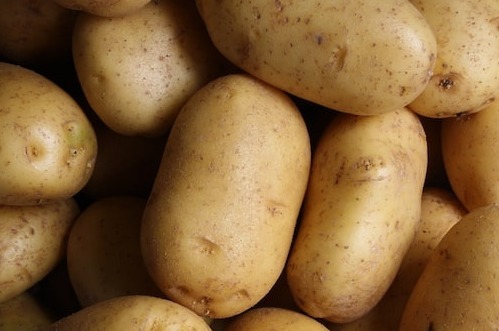
In W23 in the potato landscape, the potato production in Europe has experienced a significant decrease due to extreme weather conditions, resulting in a harvest in Northern Europe, Great Britain, and Ireland that is 2 million tonnes below the average. This reduction accounts for one-third of the total potato production in the UK and Ireland, leading to a price increase, particularly in the potato processing sector. In Latvia, the pale potato cyst nematode (Globodera pallida) has been identified in a field on a potato farm, leading to a decrease in potato yields of up to 80%. Phytosanitary measures have been established, such as a ban on the cultivation of seed potatoes, cleaning of agricultural tools, and cultivation of plants resistant to pale cyst nematodes. In Moldova, the wholesale prices for potatoes in the 2023 harvest experienced an 11-12% decrease, reaching USD 0.9-1.2/kg towards the end of May and early June. There were fewer local early potatoes available in the wholesale trade this season compared to previous seasons due to cool weather and a decline in the cultivation of early potato varieties. Despite being lower than last year's starting price level (USD 1.23/kg), the current prices are higher than usual for this time of the season. Notably, Ukrainian potatoes are dominating the Moldovan market in terms of quality. Ukraine has introduced a national standard for ware potatoes, which will be applied from June 1, 2023 by the Ukrainian Center for Scientific Research and Education for Standardization and Quality Certification. This standard classifies potatoes into early and late categories based on the timing of the harvest. The increase in packing potato prices in the UK has impacted demand from retailers, prompting supermarkets to rely more on contracted supplies to mitigate exposure to high prices in the open market. On June 6, 2023, the Mintec Benchmark Prices (MBP) for Grade 1 white packing potatoes in England reached USD 505.37/mt (GBP 400/mt), marking a weekly increase of USD 31.59/mt (GBP 25/mt) and a substantial YoY rise of 321%. As warmer weather arrived in the UK and the EU, consumer demand for fresh potatoes has eased, resulting in growers needing to increase irrigation to compensate for the recent lack of rainfall.
In Brazil, potato prices in the wholesale market in W22 are increasing due to the higher amount of rainfall in Guarapuava (PR) and Minas Gerais, which caused a decrease in the supply of potatoes available in the wholesale markets. The U.S. potato retail sales increased 16.0% from January-March 2023 to the same timeframe a year ago, with the most significant increase occurring for frozen potatoes at 41.9%, followed by instant potatoes at 16.5% and fresh potatoes at 12.7%. U.S. frozen potatoes led the surge in retail sales despite an overall volume decrease. The Russet potato market is 60% higher than in prior years in the U.S., but production has declined due to the demand for processing potatoes. This has caused supply challenges for all categories of potatoes.
Potatoes South Africa reports that 83% of South Africa's potato production is produced under irrigation, while the remaining 17% is irrigated by rainwater. The battle between the local potato industry and global importers has a longstanding history, with South Africa being a prime destination for dumping frozen processed potato products. Potato SA's head of marketing has warned that the practice of potato dumping can lead to further economic decline. On the other hand, Russia is investing in the agro-industrial complex to ensure complete food security. In 2023, the Moscow region saw an expansion in potato cultivation, with 1.65Kha compared to 2022. Urban districts of Stupino, Taldomsky, and Klin exceeded their vegetable planting targets, with areas of 390ha, 1.02Kha, and over 700ha respectively. Potato planting has already been completed in seven districts, including Bogorodsky, Pushkinsky, Istra, Serpukhov, and Yegorievsk.
China, Pakistan, and nine other countries belonging to the Belt and Road Initiative (BRI) have collaborated with international universities, companies, and organizations to establish a global network focused on the potato industry. In a gesture of support, each participating country received 100 sets of germplasm rapid diagnostic kits. Additionally, training sessions will be conducted to share expertise on potato breeding. Meanwhile, the congressional delegation from Idaho wrote a letter to the U.S. Department of Agriculture, requesting their assistance in encouraging Japanese officials to purchase fresh potatoes. Japan is a significant market for frozen U.S. potatoes. In 2022, the U.S. achieved a record of USD 2.1 billion in potato exports, and an additional USD 150 million could be gained if Japan allowed the entry of fresh U.S. potatoes into their market. Lastly, frequent power outages are causing the production costs of potato storage to increase in Bangladesh, adding to the challenges faced by individuals grappling with rising prices of essential food items. Potato prices have witnessed notable increases, and traders are apprehensive that rates could escalate further due to intensified storage conditions.






